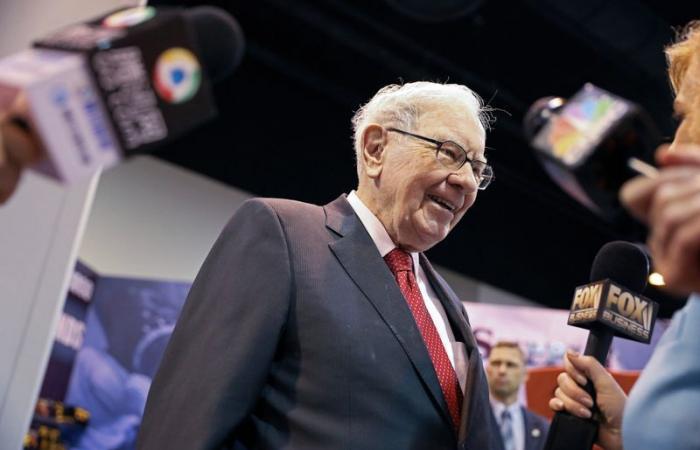On May 4, 2025, in the peaceful city of Omaha, which became the annual investor sanctuary around the world, Warren Buffett, the icon of global finance, surprised his audience by announcing that he was leaving his functions as general manager of Berkshire Hathaway.
At 94, the legendary “Oracle d’Omaha” finally passes the relay after six decades of undisputed reign at the head of one of the most powerful capital conglomerates in American history.
“I have no intention, absolutely none, to sell a single action by Berkshire Hathaway,” he hammered, collecting a two-minute ovation.
His departure does not mean a complete withdrawal: he will remain chairman of the board of directors, while Greg Abel, vice-president in charge of non-assuring activities, will take the executive reins from January 1, 2026. This transition, anticipated but precipitated by the effect of surprise of its announcement, marks a solemn page in the annals of contemporary finance.
“I am convinced that the future of Berkshire under the direction of Greg will be even better than under mine.”
The mechanics of a long prepared succession
The appointment of Greg Abel is not a surprise in itself. Since 2021, Buffett had publicly appointed this native Canadian of Edmonton, a hockey and discreet man lover, like his successor. At 62, Abel has climbed the ladder with Constance, supervising since 2018 all companies not linked to insurance. He also started to resume, last year, some of the capital distribution functions historically held by Buffett.
The insurance branches, financial pillars of Berkshire (notably Geico, General Re and National Compensation), will continue to fall under Ajit Jain, another respected vice-president and long-standing collaborator. This two -headed governance should guarantee strategic continuity, while allowing Abel to print his brand.
An inimitable investment architecture
Since his takeover of Berkshire in 1965 (then a simple dying textile manufacturer) Buffett has continued to build an extraordinary financial building. Like medieval cathedrals, each stone was placed with patience and wisdom. Today, Berkshire Hathaway is an empire composed of 189 subsidiaries operating in insurance, rail (BNSF), agrifood (Dairy Queen, See’s Candies), energy and of course, financial investments.
Between 1965 and 2024, the actions of Berkshire Hathaway appreciated an annualized return of 19.9% (almost double the S&P 500 to 10.4%)!
Buffett has managed to operate a funding source of financing: the “float” generated by insurance premiums not yet used to compensate claims. This resource, at low cost and without reimbursement maturity, constitutes one of the essential levers of its performance. Unlike a traditional investor exposed to margin calls, Buffett was able to maneuver with flexibility and long term.
As researcher Andrea Frazzini points out: “Its performance is based on three pillars: buy high -quality companies at low risk at a reasonable price, use a measured financial lever (estimated around 1.6) and above all, remain faithful to an effective strategy over a very long duration.”
The buffett myth beyond the figures
If the performance of Berkshire has been remarkable (almost doubling, in the long term, the yield of the S&P 500), which really distinguishes Warren Buffett is perhaps less financial ingenuity than the art of consistency and confidence. It is not just a question of stacking high -yield titles. Identifying sustainable, resilient companies with quality human capital is a sharp, sometimes counter-intuitive judgment. Many investors try to imitate their recipe by rushing into low volatility and high return on equity actions. Few succeeded.
Buffett cultivated an almost mystical reputation. His patient wisdom, his modest style, his disarming humility during the annual meetings of Omaha (real economic masses) consolidated around him an unwavering aura. It is this image that allowed Berkshire to collect periods of underperformance without panic of shareholders.
Emblematic bets and assumed errors
Among the resounding successes of Buffett are The Coca-Cola Company, American Express, Wells Fargo (historically), but also Applebecome one of the pillars of the Berkshire portfolio. This last investment, which began in 2016, upset the habits of the nonagenarian, historically careful in the face of tech. It was a master stroke: Apple today represents more than 40 % of the Berkshire’s side portfolio.
But Buffett is not infallible. He readily recognizes his false steps: Kraft Heinz, IBMor the airlines sold at the lowest during the pandemic. This humility, rare at its level of notoriety, is undoubtedly a key to its longevity.
“The worst investment I made? Probably Dexter Shoe Company, paid for Berkshire shares … which makes a mistake of several billion today.”
After Buffett: continuity or renewal?
While Greg Abel is preparing to succeed one of the greatest investors of all time, questions are fused: will he be able to bring Berkshire’s mind to life without being in the perpetual shadow of its founder?
Abel, deemed discreet, hard and pragmatic worker, was formed in the shadow of Buffett. He does not have his charisma, nor his media interpersonal skills, but has the full and whole confidence of the master. One of the major challenges will be the distribution of capital, a strategic and highly symbolic function.
In addition, the other son of Buffett, Howard, should occupy the role of non -executive president in the long term, as a guardian of “Berkshire culture”. This system aims to ensure the sustainability of the company’s identity: a patient, ethical and pragmatic conglomerate, turned towards the interest of long -term shareholders.
With more than $ 347 billion in liquidity, Berkshire is sitting on a mountain of dry powder ready to be used for future major investments. Buffett could still have a decisive role if a major acquisition presented itself by its full withdrawal.
An extraordinary financial and moral legacy
The withdrawal of Warren Buffett does not only sign the end of an economic chapter. It ends an era when virtue, patience and integrity were the compasses of an empire built without artifice.
Buffett leaves behind not only a colossal active portfolio, but a moral will embodied in its famous letters to shareholders, models of financial pedagogy and capital common sense. His fortune, almost entirely invested in Berkshire shares, will be bequeathed to charitable works via the foundation of his children.
“The best thing to do with my wealth is to redistribute it to those who need it most.”
The end of an era, the beginning of a myth
The departure of Warren Buffett from the general management of Berkshire Hathaway marks a historic turning point. He fades without noise, with the same stoic elegance which guided each of his choices. Rarely has a leader will have left such a deep imprint on world capitalism, without ever giving in to fashion or vain promises.
Buffett was not just a genius investor. He was a trusted builder, an architect of sustainable institutions, a captivating storyteller of economic wisdom. At a time when the markets will soon rush without its familiar voice, a certainty remains: the benevolent shadow of the Oracle of Omaha will continue to impregnate the decisions of those who strive to combine financial rigor and moral responsibility.
The legend is written. The myth begins.








